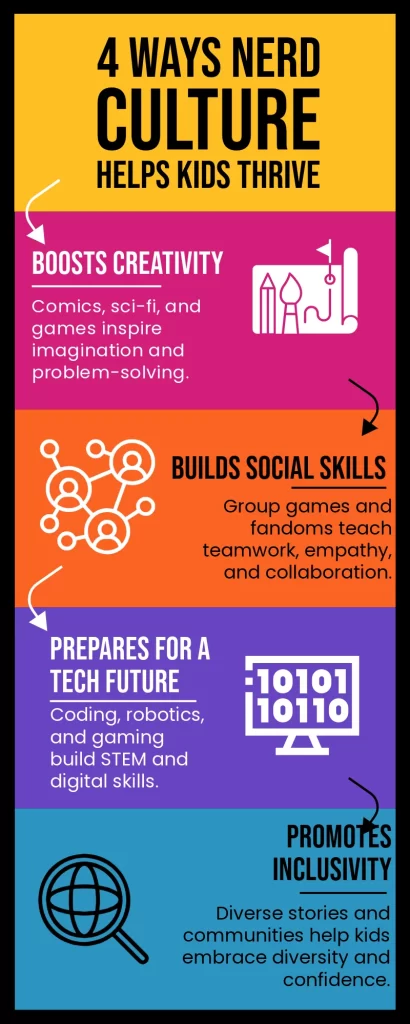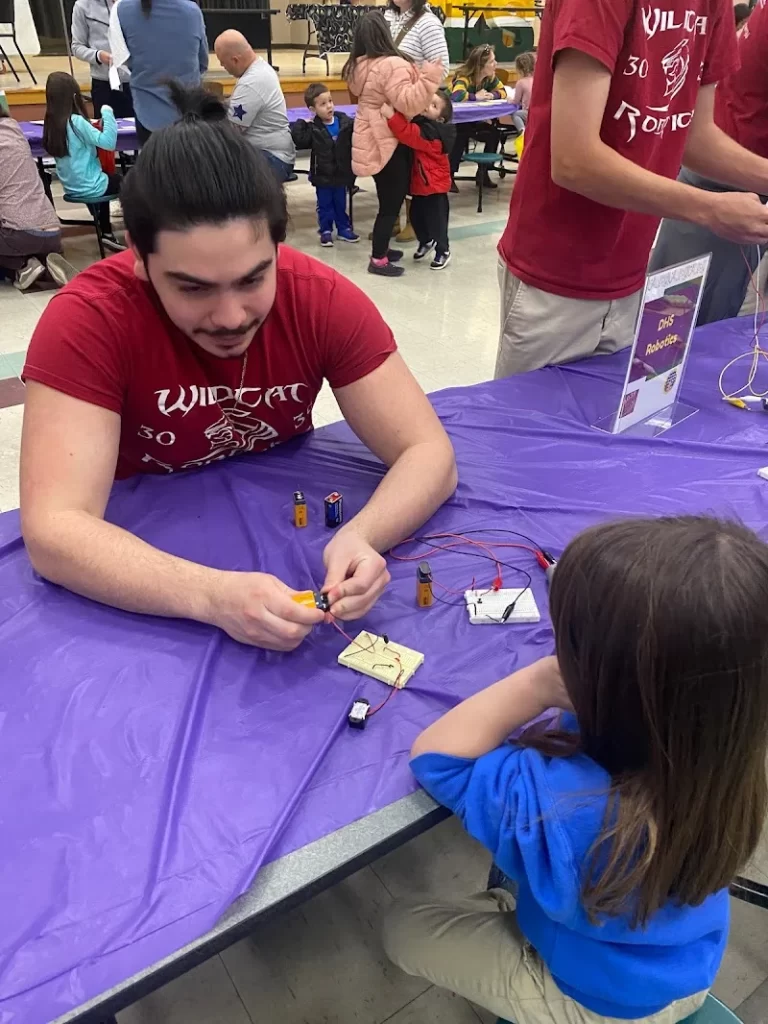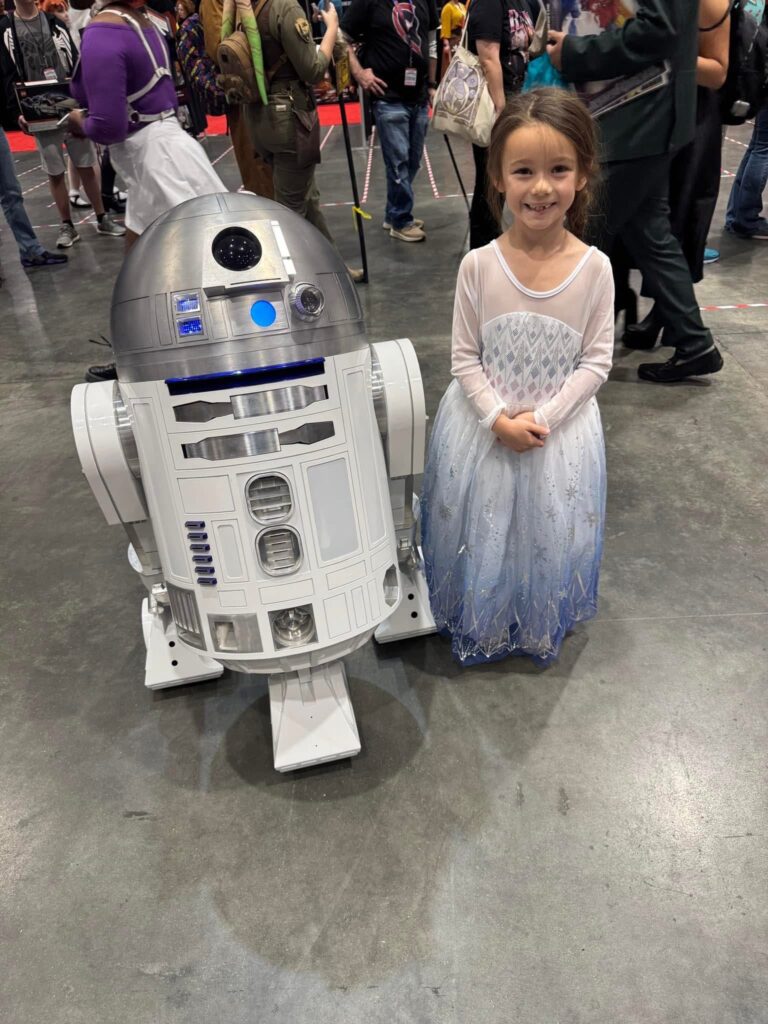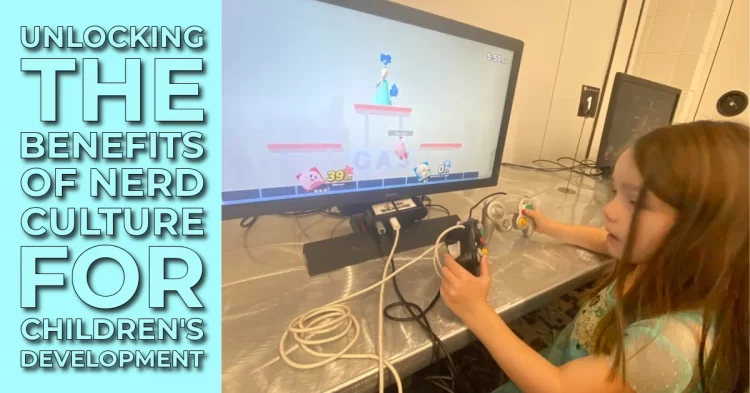Nerd culture for kids offers a unique way to foster creativity and problem-solving skills through engaging and imaginative activities. From building and exploring virtual worlds in video games to crafting stories in sci-fi and comics, nerd culture encourages kids to think creatively and explore “what if” scenarios. Hobbies like robotics, coding, and tabletop games teach critical thinking by breaking complex challenges into manageable steps, while also building confidence in their ability to solve problems.
These activities not only make learning fun but also equip children with valuable skills that prepare them for future academic and personal success. By embracing the benefits of nerd culture, kids can unlock their creative potential and develop essential life skills in a supportive and inclusive environment.
By introducing activities like gaming, comics, science fiction, and robotics, parents and teachers can help children discover passions that nurture both their minds and hearts.
As high school teachers—one specializing in AP Computer Science and the other in AP Human Geography and Environmental Science—we’ve seen firsthand the benefits of nerd culture in fostering creativity and critical thinking in kids, and not just in our own.

The Many Benefits of Nerd Culture
Nerd culture isn’t just about video games or superheroes—it’s a powerful tool for growth. Here are some key benefits of nerd culture for kids:
- Boosts Creativity: Comics and sci-fi encourage kids to imagine “what if” scenarios, fostering creative thinking and problem-solving.
- Builds Social Skills: Nerd culture brings kids together through conventions, forums, and group games, teaching teamwork, empathy, and collaboration. It also allows for a community with like-minded people.
- Prepares Kids for a Tech Future: Hobbies like coding, robotics, and gaming teach skills that are essential in today’s digital world.
- Promotes Inclusivity: Diverse characters and creators in nerd culture help children of all backgrounds see themselves as heroes and innovators.
- Parent Modeling: Young children often imitate what their parents do, so it helps create early bonds.
How to Introduce Nerd Culture by Age
The benefits of nerd culture can be unlocked at any age. Here’s how to introduce it in a way that suits your child’s developmental stage:
Preschoolers
- Activities: Simple board games and fun sci-fi or fantasy stories. And, of course, reading to your child.
- Benefits: These activities spark curiosity and imagination while keeping things light and playful.
Elementary Kids
- Activities: Beginner comics, coding games, and age-appropriate board games like Catan Junior.
- Benefits: These hobbies teach strategic thinking and help kids learn to work with others.
Middle Schoolers
- Activities: Creative video games like Minecraft, robotics kits, and cosplay crafts.
- Benefits: These activities channel passions into tangible projects, helping kids build confidence and problem-solving skills.
High Schoolers
- Activities:
- Advanced tabletop games like Dungeons & Dragons or Gloomhaven, competitive esports, game design with platforms like Unity or Unreal Engine, sci-fi and fantasy literature, graphic novels, and anime are great options.
- Robotics projects with Arduino or Raspberry Pi, cosplay, and participating in school clubs or conventions are also great options.
- Benefits:
- These activities help high schoolers refine critical thinking, problem-solving, and teamwork skills.
- They also provide creative outlets, prepare students for STEM opportunities, and foster social connections through fandoms and conventions.
- Nerd culture at this age can inspire passions that lead to future careers or lifelong hobbies.
- Also, playing games with them and not holding back signals to them that they are someone you trust and respect as an adult.
Exploring the Different Domains of Nerd Culture
The benefits of nerd culture can be found in many areas. Here’s what each one has to offer:
Gaming
- What it teaches: Strategy, teamwork, being a good winner and a good loser, and problem-solving.
- Examples: Board games, video games, and tabletop RPGs like Dungeons & Dragons.
- Benefits: Gaming helps kids think critically and work together in fun, interactive ways.
Literature
- What it teaches: Creativity and critical thinking through comics, graphic novels, and science fiction.
- Examples: Stories that introduce big ideas like heroism and resilience.
- Benefits: Literature expands kids’ imaginations while teaching important life lessons. Plus, comics and graphic novels are a gateway to more traditional forms of literature. But the secret is knowing that works in those forms can be literature as well!
Media
- What it teaches: Key values like friendship, perseverance, and self-confidence.
- Examples: Family-friendly movies, TV shows, and anime.
- Benefits: Watching and discussing media together can create shared family moments and spark meaningful conversations.

Technology
- What it teaches: Coding and robotics make tech fun and approachable while preparing kids for STEM careers.
- Examples: Platforms like Scratch or LEGO Mindstorms.
- Benefits: Tech-focused activities engagingly build problem-solving and innovation skills. It also introduces the idea of productive struggle, and that experience is always the best teacher.
Fandom
- What it teaches: Confidence and community through shared interests.
- Examples: Conventions, cosplay, and fan clubs.
- Benefits: Being part of a fandom gives kids a sense of belonging and encourages them to celebrate their passions. A lot of kids, and adults, often feel alone and isolated. Finding like minded people in a postive community can do wonders for kids.
Balancing Nerd Culture Engagement

While the benefits of nerd culture are vast, it’s important to maintain balance. Here are some tips for healthy engagement:
- Set Screen Time Rules: Make sure kids have time for other activities, like outdoor play or sports.
- Choose Positive Spaces: Help kids avoid toxic environments and focus on inclusive, supportive communities.
- Focus on Quality: Pick age-appropriate games, books, and shows that encourage learning and creativity.
I do want to talk about screen time here. I’m going against the common trend that too much screen time is bad. It’s not that I think kids should have unlimited screen time. I think we are worried too much about the quantity of screen time and not enough about the quality.
It is hard because our kids are the control group. Growing up, we didn’t have personalized screens at home, but our kids do.
We have always worried about the amount of time our little one watches, but we were way more concerned with what she watched. As parents, we have actively curated her viewing and have seen amazing results.
We do this by watching things with her. If we don’t like it, we block it. We also actively started videos that we liked for her, especially ones dealing with science, history, and social-emotional wellness. We encouraged ones where children and parents were using their imagination instead of unboxing videos.
It has made a difference. She knows some science and history that some of her peers and students do not know. Again, quantity matters, but it is less important than quality.
Overcoming Misconceptions About Nerd Culture
Nerd culture is sometimes misunderstood, but its benefits are clear. Here’s how to address common concerns:
- Breaking Stereotypes: Nerdy hobbies like comics and gaming often foster creativity, teamwork, and academic growth.
- Promoting Inclusivity: Highlight diverse characters and creators to show every child that they belong in nerd culture.
- Making It Affordable: Libraries, maker spaces, and community centers often offer free or low-cost resources like coding workshops, graphic novels, and board games.
In our classrooms, we’ve seen how embracing nerdy interests like coding, robotics, and science fiction can help students connect with academic content in exciting ways. These interests often challenge traditional stereotypes and open doors to creativity and inclusivity.
Addressing Toxicity in Nerd Culture: A Barrier to Inclusivity
Nerd culture has incredible potential to inspire creativity and foster a sense of belonging in children. However, toxic behaviors such as misogyny, gatekeeping, and harassment can make these spaces unwelcoming. As Aida Velez and Erian Mathis highlight, issues like body shaming, “fandom tests,” and backlash against diversity in media often push women and marginalized groups away from fandoms.
Ways to Combat Toxicity in Nerd Culture With Your Kids
- Educate Kids on Inclusivity
Teach children to embrace diverse perspectives and respect others’ enjoyment of media, regardless of their background or level of fandom knowledge. Nerds often were isolated in the old days, so don’t do this now. Nerd culture at its heart is about making friends and finding your community. - Encourage Positive Role Models
Showcase creators, characters, and fans who promote inclusivity and challenge harmful stereotypes. Representation in media and fandom can inspire children to value diversity. Our little one loves Nessarose in Wicked and sees her as a full character. - Hold Toxic Behaviors Accountable
Address harassment, gatekeeping, and misogyny when they occur. Calling out harmful actions helps model accountability and shows kids the importance of standing against negativity. Children understand more than we give them credit for when it comes to feelings. Their sense of justice is often better than that of adults. Reinforce that with them. - Support Safer Fandom Spaces
Encourage participation in communities and events that prioritize respect, diversity, and zero tolerance for toxic behavior. If even one person doesn’t feel safe in the group, are you really safe? - Promote Media Literacy
Help children critically assess media portrayals of gender, race, and identity. This will reduce the impact of harmful stereotypes and encourage thoughtful engagement with stories. On the flip side, discuss things like tokenism and how inclusion is sometimes faked.
By taking these steps, nerd culture can become a space where all children feel welcome. This ensures they can explore their passions, build friendships, and develop important life skills in a supportive environment.
How Adults Can Support Kids
Parents and teachers play a big role in helping kids enjoy the benefits of nerd culture. Here’s how:
- Share Your Interests: Introduce your child to your favorite games, comics, or movies, or try something new together like coding or robotics.
- Create Traditions: Host a family game night or plan trips to conventions to make these hobbies part of your routine.
- Find Mentors: Librarians, makers, or local hobby groups can inspire kids and encourage them to keep learning.
- Worried about costs? Many public libraries offer free access to graphic novels, coding workshops, and maker spaces. Online tools like Scratch or Tinkercad are also great for introducing STEM skills without breaking the bank.
As educators, we know the value of introducing kids to activities that inspire curiosity and skill-building. Whether it’s coding in AP Computer Science or exploring global perspectives in AP Human Geography, nerd culture offers kids a way to grow academically and personally.
TL;DR: Unlocking the Benefits of Nerd Culture for Kids
Nerd culture is more than just fun—it’s a powerful tool for kids’ development. Here’s why:
- Boosts Creativity: Activities like comics, sci-fi, and gaming encourage kids to think outside the box.
- Builds Social Skills: Conventions, group games, and fandoms teach teamwork, empathy, and collaboration.
- Prepares for a Tech Future: Coding, robotics, and STEM hobbies equip kids for tomorrow’s digital world.
- Promotes Inclusivity: Diverse characters and creators help kids see themselves as heroes and innovators.
- Parent Involvement Matters: Sharing nerd culture with your kids strengthens bonds and creates lasting memories.
Pro Tip: Focus on quality over quantity with screen time. Curate activities that engage their imagination and teach valuable skills.
Nerd culture can inspire curiosity, confidence, and community in kids while helping them grow into well-rounded individuals.
FAQ: The Benefits of Nerd Culture for Kids
What’s Next? Join the Movement!
The benefits of nerd culture go far beyond fun—they can shape the way kids think, connect, and grow. Now, let’s turn these ideas into action!
Keep the Conversation Alive: Head to the comments section and share your thoughts! What nerdy activities do your kids love? How have they helped your family grow closer or your child develop?
Get Inspired and Inspire Others: Share this blog with your friends, parenting groups, or educators who might benefit from these ideas. Let’s grow a community of parents and mentors who celebrate creativity and inclusivity.
Read More: We have more blogs on this and similar topics on our Nerdy Living page.
Dive Deeper: Want more tips and resources? Follow us on social media for ongoing ideas, activities, and ways to help kids explore their passions through nerd culture.
About The Author
Discover more from NolaNerdCouple.com
Subscribe to get the latest posts sent to your email.

